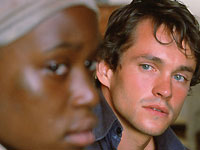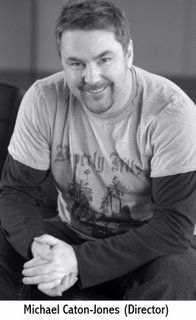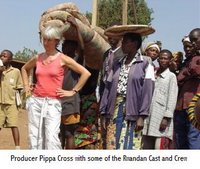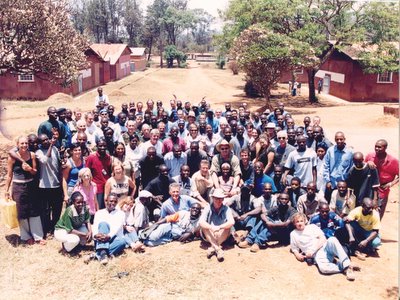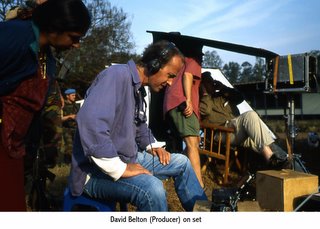Script Supervisor's Thoughts
Today's post come from Pat Rambaut, Script Supervisor of Shooting Dogs.
Six months after my partner of 25 years had major heart surgery I had a call to ask me if I wanted to go to Rwanda to work on 'Shooting Dogs.' The operation and looking after him for six months was the most scarey thing I've had to do.
A brief visit to London to meet Michael Caton Jones, the director followed. Michael describes to me the essence of what David Belton writes in his diary of March 20th 2004, when he and McJ visited the ETO school.
I decided to go.
After what I had been through in my personal life, I felt strong enough to cope with a film whose story was about so fragile a subject as genocide. After my meeting with the Michael I knew it would be a story well told.
My job as a script supervisor on a film is all about the script - the story. I need to know the story in detail by the time we shoot. I even time the script which entails visualising the action and speaking out loud the dialogue of all the characters. A lot of this I do alone. (the memory of 'Blind Flight' and Beirut and needing to escape out into the streets to remind myself I was not back in the Beirut of l985 comes to mind).
I arrived in Rwanda with less than a week to shoot. The week was full to capacity and little time to think. Documentary footag
 e set up in a corner of the busy production base, for cast and crew to watch for reference, I avoided. Knowing I had to somehow distance myself from the reality., not sure how I would cope. The difference to other films I had worked on was of course this story wasn't fiction.
e set up in a corner of the busy production base, for cast and crew to watch for reference, I avoided. Knowing I had to somehow distance myself from the reality., not sure how I would cope. The difference to other films I had worked on was of course this story wasn't fiction.A couple of weeks in to shooting we had two days off. By now I was feeling the need to learn more about what had happened. And maybe why. This was when I visited the Kigali Memorial. I can still visualise that whole exterior covered with polished granite under which I was told 250,000 children, women and men lay dead. A glimpse into the two open tombs showed rows upon rows of carefully draped coffins, some tiny. They were still finding bodies, hence the open tombs.
My lasting memory too being the room of Portraits of tiny children and babies all with equally horrendous stories of how they had been hacked to death. Such a huge waste of tiny human lives.
By the end of our visit our Guide thanked us for coming and asked us to tell the world what had happened. They just don't believe us. I began to know why I had chosen to come here.
Each one of the European crew who went out to Rwanda were very special people. It was only by being with such people did we cope.
I suppose luckily our days were very full, (getting up at 4.30am in the dark!) We had so much to shoot in so short a time each day had little free time to think beyond than that moment. But yet there were always reminders. Some of the scenes with many extras were especially hard to shoot.
One of these was one of the final scenes in the film. It was a very silent crew who filmed the aftermath of the massacre. Of course we knew the people on the ground, covering as far as the eye could see of the ETO school, were not dead, but it brought us so close to the reality of what happened in Rwanda in 1994.
Shortly after this scene, maybe even later that day we shot the scene that pr
 ecedes this - the Interahamwe surging forward to the school. Afterwards I was walking up the drive towards the ETO. The end of a long day. All the extras playing the Interahamwe noisily rushing past. My inner uneasiness at their presence feeling real (I was not alone in this feeling!). One of them tapped me on the shoulder. Startled I turned round. A young man stood there, a big smile on his friendly face, 'Can I help you with your bag?' We walked back towards the school together. His English not good, my Rwandan worse. We were back in 2004!! And we were telling a story.
ecedes this - the Interahamwe surging forward to the school. Afterwards I was walking up the drive towards the ETO. The end of a long day. All the extras playing the Interahamwe noisily rushing past. My inner uneasiness at their presence feeling real (I was not alone in this feeling!). One of them tapped me on the shoulder. Startled I turned round. A young man stood there, a big smile on his friendly face, 'Can I help you with your bag?' We walked back towards the school together. His English not good, my Rwandan worse. We were back in 2004!! And we were telling a story.As has been said before on this website, a story that needs telling, if only to help one tiny bit to stop all the fruitless killing that is happening in so many places in our world today in 2006!!
-Pat Rambaut, Script Supervisor.



